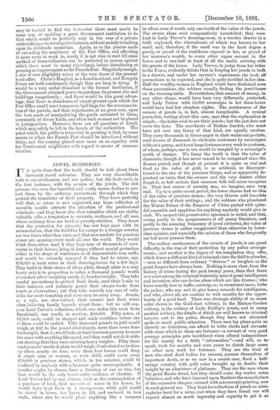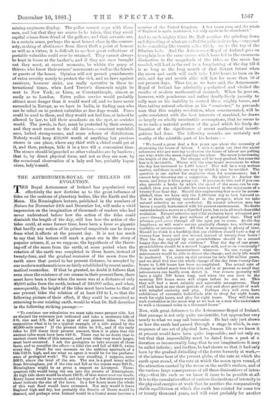JEWEL ROBBERIES.
IT is quite time that the truth should be told about these incessant Jewel robberies. They are very discreditable both to our civilisation and our police ; but the fault rests, in the first instance, with the owners of the jewels. The rich persons who own the beautiful and costly stones decline to pro- tect them by the ordinary precautions through which they protect the remainder of their property. They know perfectly well that, as crime is now organised, any large collection of movable wealth attracts the attention of the professional criminals ; and they know also that valuables which are visibly valuable offer a temptation to servants, workmen, and all men whose ordinary lives are hard or poverty-stricken. They know that the protection for property has not kept pace with its accumulation, that the facilities for escape to a foreign country are ten times what they were, and that new markets for precious stones are opening every week all over the world. They would think themselves mad if they kept tens of thousands of sove- reigns in their houses, lying in heaps, without special protection either in the shape of watchmen or of impenetrable iron walls, and would be seriously annoyed if they had to retain, say, £50,000 in bank notes in their dressing-rooms for a few days. They build-in their stores of silver plate, though plate is a very heavy article in proportion to value, a thousand pounds' worth of crushed silver weighing nearly 22 hundredweight. They take careful precautions to protect their deeds, send their bonds to their bankers, and jealously guard their cheque-books from touch or observation ; yet they take scarcely any care of valu- ables far more tempting and more easy to carry away. Jewels, as a rule, are over-valued, their owners and their wives often believing family legends about them ; but we will sup- pose Lord Trevor's collection, which was stolen this week from Brynkinalt, was worth, at auction, £50,000. Fifty notes, of £1,000 each, could be stopped and made worthless before one of them could be cashed. Fifty thousand pounds in gold would weigh, at £62 to the pound avoirdupois, more than seven hun- dredweight, that is, would take at least fourteen persons to move the mass with anything like speed, and they could not do it with- out showing that they were carrying heavy weights. Fifty thou- sand pounds' worth of plate would weigh, if calculated as broken- up silver, nearly six tons, more than four horses could drag. A single man or woman, or even child, could carry away £50,000 in precious stones, which, in ten minutes, could be rendered by anybody with a hammer quite unrecognisable. A jeweller might, by chance, have a drawing of one or two, but that would be the only trustworthy evidence of identity. If Lord Trevor had by any chance, such as the contemplation of a purchase of land, that amount of notes in his house, he would have kept them in a strong-room, while gold would be stored in boxes, too heavy to lift, and enclosed in iron walls, where also he would place anything like a treasure in silver, even if worth only one-tenth of the value of the jewels. The stones alone were comparatively unwatched; they were kept in Lady Trevor's dressing-room, in a wooden drawer in a built cupboard, the whereabouts of which was known to her maid, and, therefore, if the maid was in the least degree a gossip, or proud of the confidence reposed in her, or proud of her mistress's wealth, to every other upper servant in the house and to one-half at least of all the maids arriving with the guests of the house. Lady Trevor, to judge from her letter to the Times, evidently thinks that in keeping her jewels in bulk- in a drawer, and ender her servant's cognizance, she took all precautions to be expected, and she is quite justified in her idea. Half the wealthy women in England would have disdained even those precautions, the robbers usually finding the jewel-boxes. on the dressing-table. Nevertheless, that amount of money, in any other shape, would have been very differently protected;. and Lady Trevor with 50,000 sovereigns in her dress-boxes would have had but sleepless nights. The carelessness of the- owners of jewels is, in fact, almost inexplicable. A cynical journalist, writing about this case, says that the explanation is simple,—the ladies wish to see their jewels ; but the jest does not cover the facts. The merchants of Hatton Garden, who must have got over any fancy of that kind, are equally careless. They carry thousands in tissue-paper in their waistcoat-pocketh, send dozens of diamonds to wholesale customers by messengers without a penny, and trust large fortunes every week to postmen, of whom, perhaps, one in ten would be tempted by a sovereign's worth of stamps. We fancy the truth is that the value of diamonds, though it has never ceased to be recognised since the Roman period, and though at present it is quite as real and fixed as the value of gold, is so artificial, so dispropor- tioned to the size of the precious things, and so apparently de- pendent on taste, that the owners and the very dealers either forget it, or feel certain that common folk will never recognise it. That last source of security was, we imagine, once very, real. Up to a quite recent period, the lower classes had no idea of the value of precious stones ; the very thieves sold bracelets for the value of their settings ; and the soldiers who plundered the Winter Palace of the Emperor of China parted with splen- did emeralds and sapphires for anything anybody would give in cash. We suspect this preservative ignorance is ended, and that,- owing partly to the gorgeousness of all penny literature, and partly to the amazing frequency of jewel robberies, the value of precious stones is rather exaggerated than otherwise by lower- class opinion, and especially the opinion of those who frequently: see but never possess them.
The endless carelessness of the owners of jewels is one great difficulty in the way of their protection by any police arrange- ments; and another is the degree of the temptation they offer, which draws a different kind of criminals into the field to plunder, . —men as different from ordinary " thieves " or burglars as the great forgers have always been. Nothing is more clear, from the history of crime daring the past twenty years, than that there now exist among the criminal fraternity men of great intelligence and invention, who can devise plans which are like dramas ; who know exactly how to baffle, outstrip, or, in occasional cases, bribe the police ; who can and do give heavy rewards for intelligence, and who, above all, are content to wait months for the oppor- tunity of a good haul. There was strategic ability of no mean. order shown in the Gold-dust robbery, in the Hatton-Garden robbery, in the robbery of Lady Dudley's jewels, and in many another robbery, the details of which are well known to criminal lawyers and to the police, though they have not attracted quite so much public attention. These men lay plans quite as cleverly as detectives, can afford to bribe clerks and servants with sums which to them are fortunes—a servant of very good average principles gets bewildered when offered independence' for life merely for a little " information "—and will, so to speak, work for months and even years to clutch large sums as other men work for fortunes. They are the kind of men who steal dead bodies for ransom, possess themselves of important deeds, or as we saw in a recent case, flood a half- savage country with gold coins brought up to double their weight by an admixture of platinum. They are the men whom the great Banks dread, lest they should some ‘day render notes 'valueless, and who have imposed upon Bankers the manufacture of the expensive cheques covered with microscopic printing, now in such general use. They hunt for collections of jewels as mine- captains hunt for a mine, and when they have found one will expend. almost as much ingenuity and capacity to get it as
mining engineers display. The police cannot cope with these men, and bat that they are averse to be taken, that they avoid capital crimes from dread of the gallows, and that servants are, in a certain sense, perhaps the most honest class in the commu- nity, making of abstinence from direct theft a point of honour as well as a virtue, it is difficult to see how great collections of portable valuables could ever be retained. They cannot always be kept in boxes at the banker's, and if they are once brought out they must, at casual moments, be within the grasp of thieves who know their owners' movements as well as the friends or guests of the house. Opinion will not permit punishments of extra severity merely to protect the rich, and no laws against receivers, however strict, are really operative in these in- ternational times, when Lord Trevor's diamonds might be sent to New York, or Lima, or Constantinople, almost as easily as to London. Extra police service would probably attract more danger than it would ward off, and we have never succeeded in Europe, as we have in India, in finding men who can be relied on to protect valuables as fine dogs would. Force could be used to them, and they would not feel free, or indeed be allowed by law, to kill their assailants on the spot, as sentries would. The jewels, in fact, must be protected by their owners, and they must resort to the old devices,—constaut watchful- ness, locked strong-rooms, and some scheme of distribution. Nobody would keep £50,000 worth of anything but precious stones in one place, where any thief with a chisel could get at it, and then, perhaps, hide it in a tree till a convenient time. The stones should be:guarded as other valuables are by bankers ; that is, by direct physical force, and not as they are now, by the occasional observation of a lady and her, probably loqua- cious, lady's-maid.







































 Previous page
Previous page